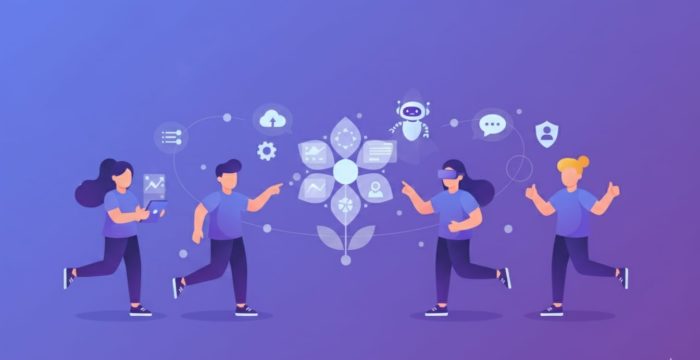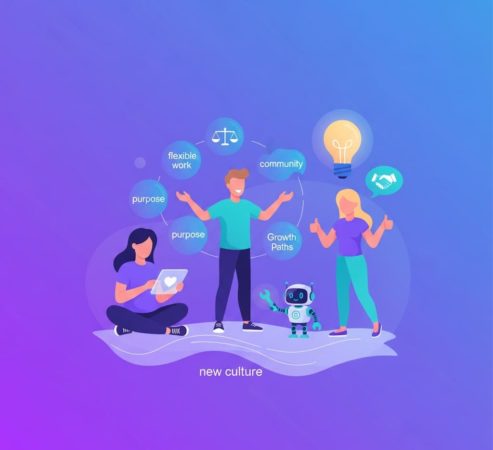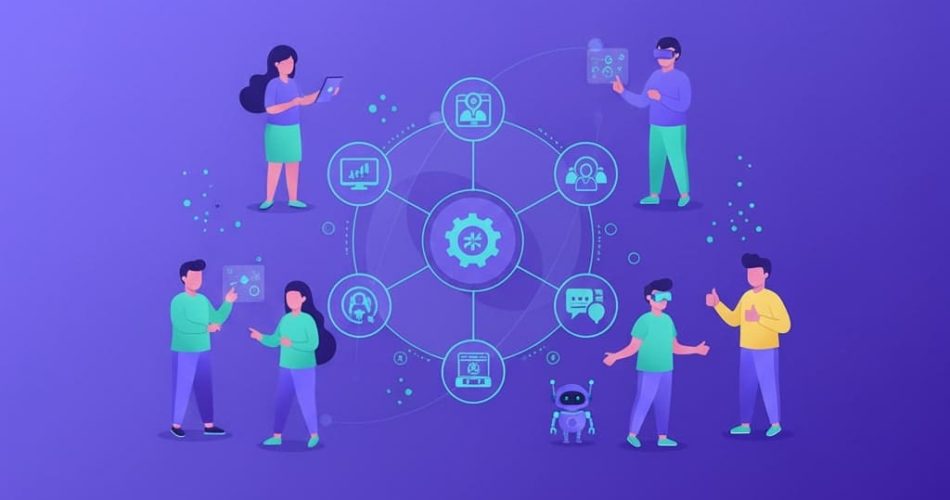If you’ve been wondering why your office feels a little different lately, here’s the plot twist: Gen Z work habits are running the show now. This isn’t the coffee-fueled hustle culture of the 2010s-it’s a whole new rhythm, powered by the first digital-native workforce that grew up switching between TikTok trends and Google Docs with ease. They’re not interested in clocking in for the sake of it; they want purpose-driven work, flexible work arrangements, and leaders who actually listen.
For HR teams, that means tossing out the “this is how we’ve always done it” rulebook and rewriting the script for HR practices 2025. Gone are the days when perks meant ping-pong tables and pizza Fridays. Gen Z wants psychological safety, transparency, and maybe a good meme in the team chat. They’re reshaping everything from how feedback flows to how culture is built-and honestly, the workplace might be better for it.
So, if your HR strategy still thinks “digital transformation” means adding another app to your stack, buckle up. Gen Z in the workplace isn’t a passing trend-it’s a full-blown culture shift.
1. Meet Gen Z: The No-Nonsense, Wi-Fi-First Workforce
If Millennials brought beanbags and open offices, Gen Z brought Wi-Fi passwords and boundary-setting. Born between the late 1990s and early 2010s, this digital-native workforce entered the job market already fluent in multitasking between Slack messages, Google Sheets, and side hustles. For them, work isn’t a place-it’s an experience that needs to fit into a bigger life picture.
Unlike previous generations who might’ve tolerated micromanagement or marathon meetings, Gen Z prefers clarity, autonomy, and authenticity. They expect transparency from leaders, crave continuous feedback, and have no problem saying “no” to outdated processes. Forget the old “9-to-5” mindset-Gen Z work habits revolve around flexibility, balance, and meaningful impact. They care about purpose-driven work and want to know their contributions matter beyond the next quarterly report.
And while some managers might label them “impatient,” the truth is, they’re efficient. Why wait for an annual review when you can fix things in real time? Why stick to rigid HR practices when collaboration tools can make work smoother and faster? Gen Z is not rebelling against structure-they’re redesigning it.

2. The Gen Z Effect: How HR Practices Are Getting a Glow-Up in 2025
Let’s be honest – HR used to be all about handbooks, annual reviews, and “open-door policies” that somehow led nowhere. Then Gen Z in the workplace showed up and asked, “So… why are we doing it this way?” And just like that, the HR practices 2025 makeover began.
First up on the list: flexible work arrangements. Gen Z doesn’t see flexibility as a perk; it’s the baseline. They want to work when they’re most productive – whether that’s 7 a.m. with a latte or 10 p.m. with lo-fi beats. For HR, that means moving away from rigid schedules and toward results-driven performance models that actually trust people to get their work done.
Next? The end of the dreaded annual review. Gen Z thrives on real-time feedback – the same instant validation loop that powers their favorite apps. They expect managers to coach, not criticize, and to create a two-way dialogue where feedback is frequent, transparent, and actionable.
And let’s not forget the culture shift. Forget “fun Fridays” – Gen Z wants authenticity every day. They expect purpose-driven work, inclusive policies, and leaders who walk the talk. HR is no longer about compliance checklists; it’s about designing experiences that make employees feel seen, supported, and valued.
So yes, HR got a glow-up – and it’s one with more empathy, more flexibility, and way fewer buzzwords.
3. Tech, TikTok, and Transparency: The Tools Gen Z Uses to Get Work Done
If there’s one thing you can count on with Gen Z, it’s that they’ll Google it, Slack it, or turn it into a meme before sending an email. As the first truly digital-native workforce, Gen Z doesn’t separate “online” and “offline” work – it’s all just… life. Their comfort with technology isn’t a skill; it’s second nature. And that’s exactly what’s redefining the day-to-day rhythm of modern teams.
For starters, Gen Z work habits are built around fast, frictionless communication. Email threads? Too slow. They’d rather use real-time tools like Slack or Teams, where collaboration happens instantly and transparently. This shift is pushing HR practices 2025 toward more agile, tech-enabled systems that actually meet employees where they are – on their phones, laptops, and yes, sometimes even in a TikTok comment thread.
They’re also big on openness. Gen Z wants to know how decisions are made, what company values really mean, and whether leadership is walking the talk. They crave authenticity and transparency more than polished PR statements. For HR, that means doubling down on clear communication, accessible data, and internal platforms that keep everyone informed and included.
And here’s the kicker – they’re not tech-dependent for the sake of it. The goal isn’t more tools; it’s better tools that make collaboration effortless and workflows smarter. Whether it’s automating routine HR tasks or centralizing company knowledge, Gen Z expects technology to remove roadblocks, not add them.
So if your team’s still juggling endless spreadsheets and lost Slack messages, it might be time to take a cue from the generation that can manage a project, a playlist, and a personal brand – all before lunch.
4. Redefining Culture: What Gen Z Really Wants From Work (and Why It Matters)
If you think free snacks and casual Fridays are enough to win over Gen Z, think again. This generation isn’t here for surface-level perks – they’re here for meaning. Gen Z work habits are driven by purpose, not ping-pong tables. They want to work somewhere that values impact over image, where diversity isn’t a slide in a presentation but a lived reality.
For HR leaders, this means culture-building has officially graduated from “nice to have” to “non-negotiable.” Gen Z expects purpose-driven work, mental health support, and transparency that goes beyond mission statements. They want to see their company take a stand – on sustainability, equity, and community – and they want to know how their daily work connects to something bigger.
And here’s the twist: they’re not asking for less structure; they’re asking for better structure. A culture that supports flexible work arrangements, celebrates individuality, and rewards collaboration over competition. The kind where you can log off on time without guilt and still get recognized for your results.
They want to see their company take a stand — on sustainability, equity, and community — and they want to know how their daily work connects to something bigger. Recent research from Deloitte’s Gen Z and Millennial Survey backs this up, revealing that purpose and values-driven leadership are top priorities for younger employees entering the workforce.
In short, Gen Z isn’t anti-work – they’re pro-balance. They’ve redefined success to include mental well-being, purpose, and belonging. And if companies can keep up, they’ll gain not just loyal employees, but genuine advocates who help shape a more human, future-ready workplace.

7. From Payroll to Purpose: How HR Tech Is Evolving with Gen Z
Once upon a time, HR tech was about spreadsheets, attendance logs, and payroll cycles. Fast forward to 2025, and that world feels prehistoric. With Gen Z work habits driving change, HR tools are no longer built for administration – they’re built for experience.
Gen Z wants tech that works as fast as they do. Clunky systems? No thanks. Endless data entry? Hard pass. They’re looking for platforms that make their work lives smoother – from automation that cuts the boring stuff to employee experience tools that make collaboration and recognition effortless.
For HR teams, this shift means thinking beyond compliance and leaning into culture. HR practices 2025 are all about humanizing technology – using bots to streamline tasks while freeing up time for connection and creativity. Tools like AttendanceBot, for example, help manage time off, hybrid schedules, and productivity right inside Slack or Teams – exactly where the digital-native workforce lives and works.
In short, HR tech isn’t just tracking hours anymore. It’s shaping how people feel about work. And in the age of Gen Z, that emotional connection is the real productivity boost.
8. Okay Boomer, But Make It Collaborative: Managing a Multi-Gen Workplace
Here’s the reality – not every workplace is filled entirely with Gen Zers, and that’s a good thing. The mix of Baby Boomers, Gen X, Millennials, and Gen Z makes for a wild cocktail of perspectives, priorities, and Slack emoji reactions. But it also brings one of the biggest modern HR challenges: keeping everyone in sync.
Gen Z work habits have set new standards for openness and speed, while older generations may value process and predictability. The key isn’t to pick a side – it’s to build a culture where both coexist. HR leaders are learning that the trick to managing a multi-gen workplace isn’t about who’s “right,” but about who’s heard.
That’s where empathy and adaptive leadership come in. HR pros who create spaces for cross-generational mentorship – where Gen Z shares digital fluency and older employees share institutional wisdom – unlock the best of both worlds. Throw in some flexible work arrangements, transparent communication, and shared goals, and suddenly “generational differences” become “generational advantages.”
Think of it less as a culture clash and more as a group project – one where everyone finally pulls their weight.
9. What It Means for HR Leaders: Turning Gen Z Demands Into an Advantage
At this point, it’s clear – Gen Z in the workplace isn’t just influencing trends; they’re reshaping the foundations of how companies operate. But for HR leaders, that’s not a warning – it’s an opportunity.
The way forward starts with listening. Understand what Gen Z work habits reveal about the future: the desire for purpose-driven work, mental well-being, flexibility, and transparent communication aren’t passing fads. They’re blueprints for a healthier, more human workplace.
Invest in tools that make life easier, not busier. Redesign policies around trust and autonomy. Build cultures that recognize individuality while still driving collective success. The payoff? A team that’s more engaged, loyal, and innovative – not just because they have to work, but because they want to.
As 2025 unfolds, HR’s mission isn’t just to manage people – it’s to evolve with them. And if Gen Z has taught us anything, it’s that when work has purpose, everyone wins.
The Gen Z Takeaway
The rise of Gen Z work habits isn’t the end of traditional work – it’s the remix the workplace needed. Their influence is pushing HR to be faster, kinder, and smarter, blending tech with empathy and policies with purpose. For HR leaders, the goal isn’t to tame Gen Z’s expectations but to learn from them. Because the truth is, the future of work isn’t coming – it’s already here, sending Slack messages, asking thoughtful questions, and expecting better. And honestly? That’s a future worth building.
